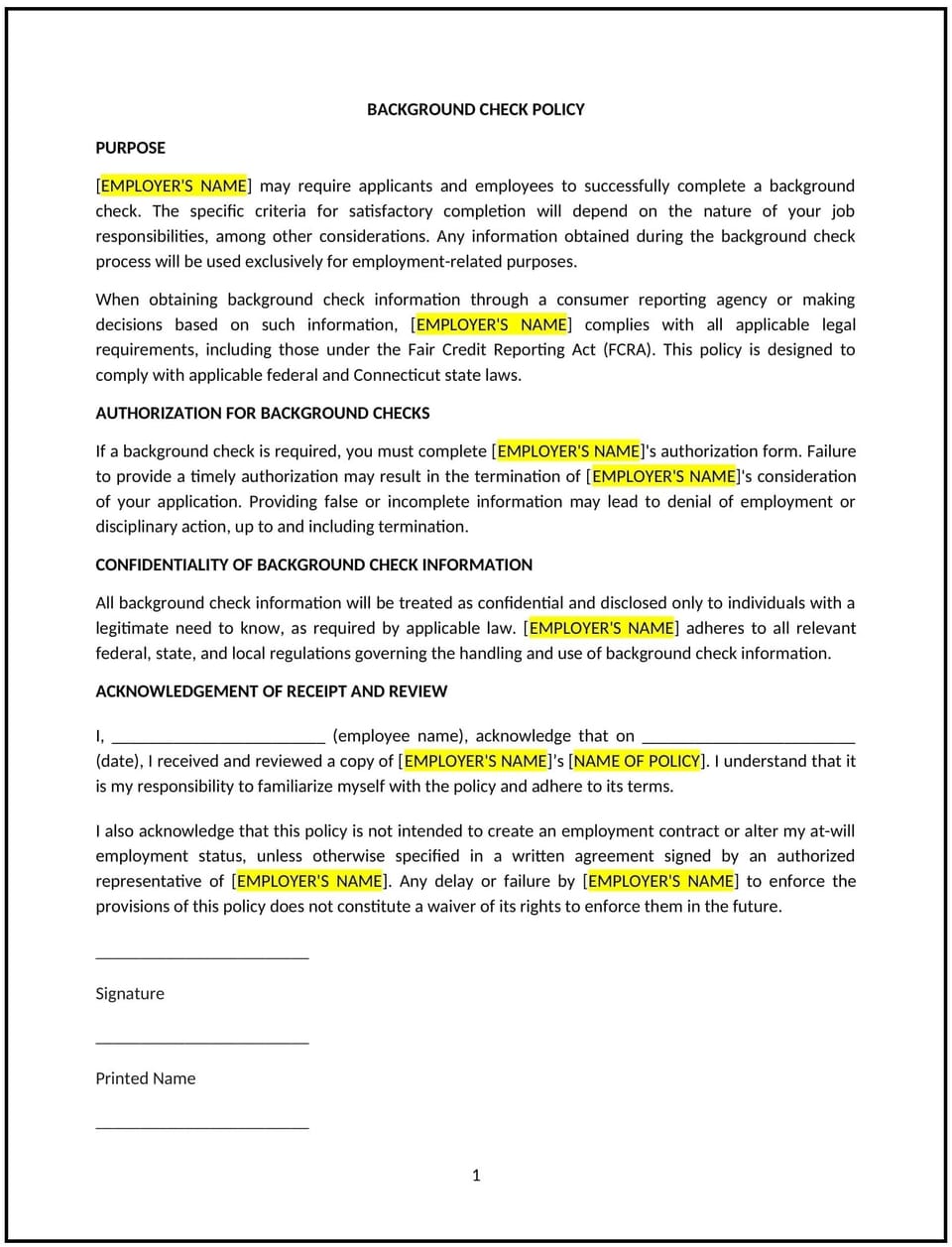Background check policy (Connecticut): Free template

Background check policy (Connecticut)
A background check policy helps Connecticut businesses establish clear guidelines for conducting background checks on potential and current employees. This policy outlines the scope of background checks, including criminal history, employment verification, and other relevant checks, while ensuring compliance with state and federal laws.
By implementing this policy, businesses can make informed hiring decisions, maintain a safe work environment, and mitigate potential risks.
How to use this background check policy (Connecticut)
- Define the scope: Specify which background checks will be conducted, such as criminal history, credit checks, and employment verification, and the reasons for each.
- Obtain consent: Ensure that candidates and employees are informed about and give consent to the background check process.
- Comply with legal requirements: Align the policy with Connecticut’s laws regarding background checks, including the Connecticut Fair Employment Practices Act and restrictions on using criminal records.
- Address adverse findings: Establish a process for reviewing and addressing negative findings in a background check, ensuring compliance with the Fair Credit Reporting Act (FCRA) and state-specific requirements.
- Maintain confidentiality: Ensure that all background check information is handled confidentially and securely to protect employee privacy.
Benefits of using this background check policy (Connecticut)
This policy offers several benefits for Connecticut businesses:
- Supports compliance: Ensures the business adheres to Connecticut and federal laws regarding background checks, reducing legal risks.
- Promotes safety: Helps ensure a safe work environment by identifying potential red flags, such as criminal history or false employment records.
- Reduces liability: Minimizes the risk of negligent hiring by conducting thorough checks on employees who will have access to sensitive information or vulnerable populations.
- Enhances decision-making: Provides accurate information that supports informed hiring and promotion decisions.
- Protects privacy: Ensures that background check information is handled and stored in compliance with privacy regulations.
Tips for using this background check policy (Connecticut)
- Communicate clearly: Ensure candidates and employees understand the background check process and the types of checks that will be performed.
- Obtain written consent: Always secure written consent from candidates before conducting any background checks, as required by law.
- Handle findings with care: Review background check results fairly and consistently, and provide candidates with an opportunity to explain any adverse findings.
- Update as needed: Periodically review and update the policy to reflect changes in Connecticut laws or company practices.
- Train hiring managers: Provide training to hiring managers on the appropriate use of background check information in hiring decisions.
Q: How does this policy benefit my business?
A: The policy helps protect the business by ensuring compliance with state and federal laws, improving the safety of the workplace, and making informed, responsible hiring decisions.
Q: What types of background checks should we conduct?
A: Common background checks include criminal history, employment verification, education verification, credit reports (where appropriate), and reference checks, depending on the nature of the job.
Q: How should we handle negative findings in a background check?
A: The business should follow a consistent process, such as reviewing the findings, providing the candidate an opportunity to explain, and ensuring any decisions are based on the relevance of the findings to the job.
Q: Can we deny employment based solely on a criminal record?
A: Under Connecticut law, criminal records cannot be used as a blanket reason for denial; businesses must consider the nature of the offense, the time elapsed, and its relevance to the job. Be sure to follow the Fair Chance Hiring laws.
Q: How often should this policy be reviewed?
A: The policy should be reviewed annually or whenever there are changes to Connecticut laws, federal regulations, or business needs regarding hiring practices.
This article contains general legal information and does not contain legal advice. Cobrief is not a law firm or a substitute for an attorney or law firm. The law is complex and changes often. For legal advice, please ask a lawyer.


